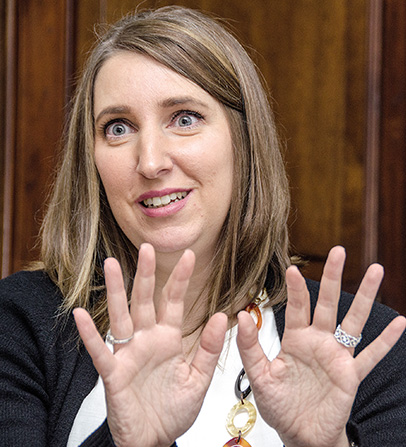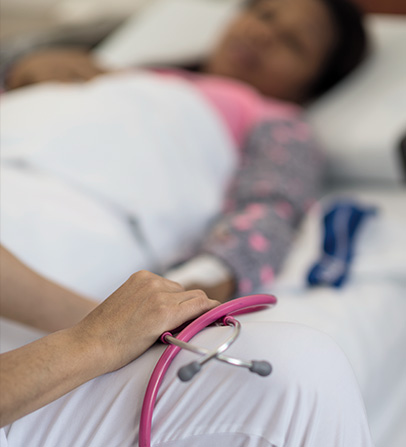Regarding phenomena such as covid-19, scientific research is recognized as a primary activity, not a secondary one
By: Inés Elvira Ospina Echandía
Photos:
Science and Tech

By: Inés Elvira Ospina Echandía
Photos:
March 6, 2020, will be documented in the history of Colombia as the day the country registered its first case of COVID-19. As from that moment, the efficiency and reaction of private and public entities were put to the test to face this public health emergency—an emergency that had no precedent in the world, at least not in the past century. Among the first organizations to provide their knowledge and skills to the service of society was the Universidad del Rosario, which, thanks to its robust research ecosystem, could react effectively and collaboratively to develop projects that seek to save lives.
The strength in the research area that the university already had allowed it to react fast to the crisis caused by the COVID-19 pandemic and to be at the service of society and involved entities”, Stéphanie Lavaux states, vice-president and provost of the Universidad del Rosario until July 2020, and current professor of the School of International, Political, and Urban Studies of this institution.
For Lavaux, the maturity process achieved in the past two decades has managed to create a very diverse research agenda that allows teams to work deeply and extensively on a wide range of problems; these problems merge aspects of basic and applied science. This means a resolution of problems that affect and afflict society in all the major fields wherein the university is involved.
“That research strength has allowed us to diversify the portfolio of topics; strengthen research teams who already combine basic and applied science to react to the different situations in a structured manner; and work on the current problems of society both in the country and around the world. This was exactly what was reflected in the pandemic”, explains Political Scientist Lavaux.
Despite the fact that COVID-19 is a disease unknown to humanity, extensive research was conducted at Universidad del Rosario, which allowed rapid transition from theory to practice as was required by this crisis. Many are the examples experienced at the university, in all academic units, which show groups and researchers’ readiness, adaptation, and reactivity to contribute toward understanding and resolving problems related to the pandemic. One of those examples is shown in the project of mechanical ventilators for breathing support, a technological innovation based on research conducted at the School of Medicine and Health Sciences (Biomedical Engineering Program), which allowed the elaboration of a proposal and its submission to the National Government to develop a prototype with unique characteristics, only some weeks after the first case was detected.
“The fact that this ventilator was designed to work with solar panels shows the social sensitivity that the university imprints in its researchers. That combination of adapting theory to reality is extremely important in a country such as Colombia, where, especially in this case, the difficulties of electricity existing in some regions must be considered. It is about offering all our scientific capacity to those who need it the most,”, empathizes Lavaux.
A step toward the open data policy
“We are still far away from the ideal situation in which all scientific data were public and available to everyone. It is a culture we need to acquire, but situations such as this show the importance of doing this. We have taken a step forward in some communities that decided to work together. That was the case of plasma research, in which scientific data were released, and this allowed progress and sharing of the findings. This project showed a commitment to open data from a worldwide scientific community”, claims Lavaux.
The project known as CoronaMonitor Colombia was carried out in the same way. It is a true citizen science project that, through a virtual survey, follows up the evolution of the disease in those infected and the conditions of the population’s preventive isolation. It intends to generate information with high geographic frequency and accuracy. Its aim is to design tools, such as maps with georeferenced cases, and to identify prevention routes and assistance. The initiative was created by the Universidad Eafit and supported by the Universidad del Rosario and Innovations for Poverty Action, among other entities.

Political Scientist and Academic member of the Universidad del Rosario, Stéphanie Lavaux, states that “Not a single moment can be wasted of the time dedicated for research. This pandemic proved how circumstances may change abruptly and how being ready for scientific research, considering this activity as priority and not as a secondary task, allows us to react immediately. It is not an intellectual whim: Science really offers solutions to society, which, in many cases involve survival”.
“The situation allowed communities to share real data. Of course, we are still far away from having a scientific community willing to have open data permanently because in order to do so, it is necessary to lose the fear. However, in a crisis, there are always two paths: Pure and tough selfishness or unconditional and open collaboration. In this case, Colombian universities gave an example and chose the second path. We reaped the fruits of hard work that was decades in the making by convincing ourselves mutually of the fact that the path was to collaborate. This crisis has brought us closer together, it has made us share research and technical teams, equipment, laboratories, and even financial resources and training spaces. We have also shared protocols and good practices. This is without a doubt one of the greatest and most positive lessons we need to capitalize,”, she explains.
What has been experienced until now due to this COVID-19 public health emergency has taught us several lessons. The first lesson is the importance of research, especially in a country such as Colombia. Professor Lavaux stated the following:“Not a single moment can be wasted of the time dedicated for research. This pandemic has proved how circumstances may change abruptly and how being ready for scientific research and considering this activity as priority, not a secondary task, allows us to react immediately. It is not an intellectual whim. Science really offers solutions to society that in many cases involve survival.”
The second lesson learned was that research must not ignore reality and must always seek collective well-being. According to her, this represents the identity of the university, which is reflected in the whole research agenda. It is what allows scientists to define priority topics and what the president, Alejandro Cheyne, calls ‘the common good’, that is, the collective gain.

Despite the fact that COVID-19 is a disease unknown to humanity, extensive research was conducted at the Universidad del Rosario that allowed the transition from theory to practice rapidly as required by this crisis.
Decades of investigating employing that approach is one of the strengths that allowed for an immediate reaction to the situation because university researchers did not hesitate for a second to make their research agenda available to the different fields of studies for the fight against the pandemic, both at the national and regional levels. Groups and centers of research belonging to different faculties and schools have developed high-impact projects for Colombians.
"The third item to be highlighted is the availability of a robust management system, working pragmatically, because one thing is to have everything ready in the laboratories and another thing is to provide support to leverage innovation and transference toward society. The Universidad del Rosario was ready, and therefore, it was able to accelerate its research to obtain resources and achieve, for example, an overlap between institution al investment and donations from the private sector to boost these research agendas”, said Lavaux
The university’s research ecosystem allows its scientists to dedicate time and effort to projects without having to worry about how to obtain resources, support, or national and international partners in order to continue.
This last item that refers to collaborative work is the fourth factor highlighted by the expert as one of the merits of the university. “Our researchers are not isolated. They have very solid collaborative networks with other scientific teams in the world. Being part of a wider community offers them exceptional opportunities to work in teams and obtain visibility”, she said.
Research projects at the Universidad del Rosario were developed in collaboration with other national and international academic centers, with shared leadership, and with complete openness to collaboration. Research has always involved other universities, research centers, hospitals, and civil social or non-governmental organizations.
The restatement about the fact that the university’s commitment to research is extremely important provides great satisfaction to the institution and drives it to continue to strengthen the different research groups.
“All projects have their schedules and times, but no matter which they are, the university’s main responsibility is to support these projects. That is why the first challenge is to accelerate the processes even more because many of them are projects that should be developed in a few months and have a direct and fast impact on society, which is not so easy for a complex institution such as a university. However, the experience lived nowadays, to know how to answer cannot be applied to only one situation; instead, these lessons learned need to be included in daily activities for the future”, states Stéphanie Lavaux.
Although the results of these projects will greatly depend on the progress of scientific findings around the world and on the path that this pandemic may take at the regional, national, and international levels, the university will include all lessons learned during this situation to both the management and results. Without doubt, the experiences lived will help research groups develop more robust agendas that allow a more agile reaction to phenomena such as COVID-19, which threaten life at a level that is, at the same time, particular and global.
“Hopefully this helped Colombians become aware of the power of science, the importance of scientists, and their participation in leading international networks. This has positioned Colombia as a country that contributes. Moreover, we need to take advantage of what has happened to encourage young people to be keener toward science and make them understand that it is not about a laboratory scientist without contact with reality but about science really saving the world”, concludes the former academic vice-president and provost of the Universidad del Rosario.